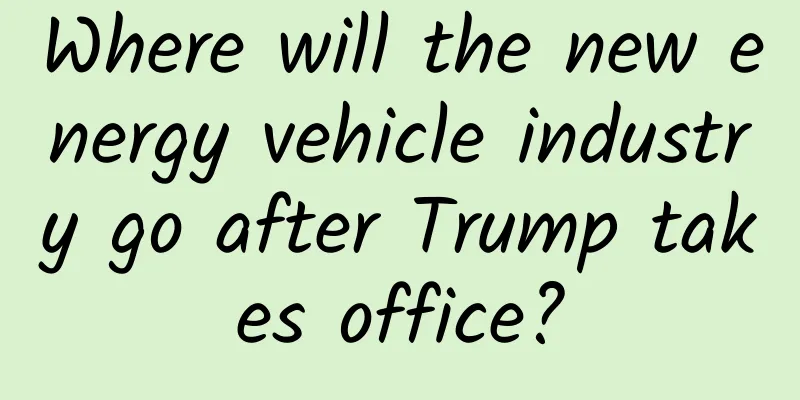Where will the new energy vehicle industry go after Trump takes office?

|
With the change of the White House, all industries are paying attention to the future policy direction. According to foreign media reports, with the election of Republican candidate Trump as the US president, the new US government may rely more on traditional energy. In previous remarks, Trump believed that oil is the lifeline of the United States, and oil and gas production should be increased to protect the employment opportunities of American oil workers. After taking office, he may cancel the US photovoltaic investment tax credit and other new energy subsidy policies. The disappearance of preferential policies for electric vehicles is not good news for US new energy manufacturers. Trump is not optimistic about new energy Trump once publicly stated, "An agency like the Environmental Protection Agency is a joke. It is a stumbling block to our job creation and economic growth." He also called global warming a "hoax" and said that if he wins the election, he will withdraw the United States from the Paris Agreement and stop US funding for all United Nations global warming projects. Unlike Obama, who attached great importance to new energy vehicles, Trump almost disdains it. He once claimed that he would review the policies and regulations on fossil fuels and approve the Keystone XL oil pipeline project (transporting heavy crude oil produced from Canadian oil sands) to enhance the competitiveness of the coal industry. On the contrary, Trump's indifference to the emerging auto industry will lead to a crisis for companies like Tesla. According to current US policies, consumers can get a discount of up to $7,500 (about 51,000 yuan) when purchasing electric vehicles, which makes it possible for Tesla to develop low-cost electric vehicles that are affordable to ordinary people. However, in the future, it will face more uncertainties. Tesla is hurt According to the policy previously issued by the US government, as long as the manufacturer of electric vehicles has not reached the tax exemption deadline stipulated by the federal government, consumers can enjoy a tax credit of $7,500 when purchasing electric vehicles. This means that if consumers choose to buy a Tesla Model 3 with a guide price of $35,000, they can save 20% of the cost with government subsidies. It is important to know that 20% cost savings are still very important for driving the market. The United States is not only Tesla's largest market, but also the largest market for new energy vehicle sales of foreign brands including Nissan, Toyota and General Motors. Sales statistics show that Tesla sold 22,100 units in the U.S. in 2015, accounting for more than 40% of global sales. Nissan Leaf followed closely behind, with sales reaching 159 units. The Volt, the first mass-produced electric car under the GM Chevrolet brand, also sold about 13,300 units in the U.S. in 2015. It is foreseeable that if Trump has new policies that are not conducive to electric vehicles, the markets of the above-mentioned multinational automakers will be impacted. However, compared with other auto brands, Tesla will obviously be hit harder. Not only sales, but also future profits may be affected. Tesla finally announced a profit in the third quarter of this year. Although it was only a net profit of 22 million US dollars, it was also its first profit in the past three years. It has to be said that all this is very valuable. However, some analysts said that Tesla's profit does not come from car revenue, but depends on selling carbon emission credits to other car companies. Of Tesla's revenue of 2.298 billion US dollars in the third quarter, 2.148 billion US dollars came from car transactions and 139 million US dollars came from carbon emission transactions. If there is no carbon emission trading, Tesla will still lose more than 100 million US dollars. How big is the impact? Although, according to Trump's opposition to Hillary's promotion of renewable energy during the campaign, he may not only cancel the purchase discount for electric vehicles after he takes office, but also affect carbon emissions trading. Based on this speculation, this may be very bad news for the new energy vehicle industry, but in the future implementation process, it is still unknown how much influence the Trump administration will have on the new energy vehicle industry. At the same time, some analysts believe that the current pace of electric vehicle technology innovation is enough for new energy vehicle companies to overcome the above obstacles. Although Trump is opposed to green renewable energy, new energy vehicles are still an unstoppable trend worldwide. According to German media reports, before this, German Deputy Minister of Economy Rainer Bak said that by 2030, all registered new cars in Germany must meet zero emission standards to reduce air pollution. By then, Germany will also ban the sale of traditional internal combustion engine cars to achieve the goal of zero emissions for new cars. It is reported that the German Federal Senate has passed a resolution to ban internal combustion engines in 2030. In China, the government is also vigorously encouraging the development of new energy vehicles. In addition to providing a large amount of financial subsidies, the government is expected to introduce a carbon credit trading system in 2018 and further strictly limit the fuel consumption limit of traditional vehicles. This means that even if the United States closes the door to new energy, new energy vehicle companies like Tesla can still find new positions in other global markets. Data shows that of the 549,000 electric vehicles (pure electric and plug-in hybrid passenger cars) sold worldwide in 2015, sales in the United States accounted for less than 30% of the market, while the remaining countries including China, Norway, the United Kingdom, France, Japan, Germany and others still accounted for more than 70% of the global market share. In addition, some industry insiders pointed out that from a macro perspective, the new energy industry may not be curbed because of Trump's coming to power. The purpose of the new energy industry is not in conflict with Trump's energy independence. Both are aimed at ensuring energy status. Due to his business nature, it is understandable that Trump has no good feelings towards long-term profit projects such as new energy. However, just like the shale revolution that took place during Obama's term, which was almost contrary to the "withdrawal from oil" policy, the words and deeds of politicians will never be 100% consistent, and President Trump cannot and does not need to kill the new energy industry. As a winner of Toutiao's Qingyun Plan and Baijiahao's Bai+ Plan, the 2019 Baidu Digital Author of the Year, the Baijiahao's Most Popular Author in the Technology Field, the 2019 Sogou Technology and Culture Author, and the 2021 Baijiahao Quarterly Influential Creator, he has won many awards, including the 2013 Sohu Best Industry Media Person, the 2015 China New Media Entrepreneurship Competition Beijing Third Place, the 2015 Guangmang Experience Award, the 2015 China New Media Entrepreneurship Competition Finals Third Place, and the 2018 Baidu Dynamic Annual Powerful Celebrity. |
<<: Not too quiet: US requires electric cars to have sound
>>: Investment in the power battery industry remains hot, and the industry reshuffle is accelerating
Recommend
930,000 years ago, human ancestors were on the verge of extinction? Chinese scientists conduct the first "census" of ancient humans
As a person living in today's society, are yo...
During the day, only the back is visible, but at night, I come alive. Actually, “you can’t judge a book by its cover”!
“Where’s the slow loris?” Only the back remains d...
Video websites have entered the era of competition among fathers, but profitability is still the top problem
With Xiaomi's entry into iQiyi and Youku Tudo...
Android common tools source code collection
[[121410]] This article mainly introduces and sum...
How to set prices to achieve the highest profit for products? 5 Win-Win Price Discrimination
In the face of price, all kinds of promotions pal...
Are bananas the "feces pusher" of the intestines? You need these foods to have a pleasant poop
For people who often suffer from constipation, go...
How to plan an efficient App marketing operation plan!
In recent years, mobile Internet has developed ra...
When the projector becomes a "ball": Haier iSee mini user experience
Nowadays, electronic products come in more and mo...
The real-life version of "Mech Warrior" goes to war for the country, and there is another world behind the crown
As summer turns to winter, the Paris Olympics hav...
Why do I advise you to lose weight in winter? Because the effect is so good
As soon as winter comes, men, women, old and youn...
World Psoriasis Day | Don’t brag, this kind of “ringworm” cannot be ignored!
October 29 is World Psoriasis Day. Psoriasis, com...
What are the benefits of Douyin Blue V enterprise certification? How to apply for Douyin Blue V certification?
When most people operate a Douyin account, they c...
I have no idea about the marketing H5 for Qingming Festival. What else can I do to create a hit product this year?
The Qingming Festival is approaching, and activit...
Alibaba Mini Program Agency, how much does it cost to be an agent for a pregnancy and childbirth mini program?
There are two types of Ali pregnancy and childbir...
Have you fallen into these 5 pitfalls of community operations?
Because it's simple, everyone wants to do it....
![[Live] Technology or management, how should programmers plan their career path?](/upload/images/67ebd64600305.webp)








